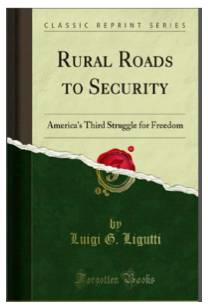
RURAL ROADS TO SECURITY
America’s Third Struggle for Freedom
RT. REV. MSGR. LUIGI G. LIGUTTI, LL.D
Copyright, 1940
The Bruce Publishing Company
Printed in the U.S.A.
Excerpt beginning on page 92:
Tenancy and land speculation constitute a very serious economic menace and should be reduced to a minimum. But there is a more serious economic menace on the horizon which also involves the land, and follows when ownership and tenant systems break down; namely, corporation farming. Although this menace has not progressed very far, yet it is very serious because it is being promoted by the industrialized, urban-minded, mechanized, stock-gambling forces of this generation. The unsound, agricultural technique of corporation farming will ultimately bring this system to naught. But America, unless we do some thinking and take effective action, may try this unsound agriculture too, if for no other reason than that it makes so many promises under the aegis of our American economic idol, the corporation.
Corporation farming will in time destroy itself with its mechanical methods in a field essentially biological, but before this stupidity will reap its empty harvest, our American families will be finally and completely uprooted from the soil. All ownerships will pass to United Farms Incorporated. All rural skills, cultural patterns, traditions, communities will be obliterated. In many places, if not all places, the present farm population will be replaced by people not now engaged in agriculture, for the inefficient land corporations will have great need of imported cheap labor. They will have to reduce the populations in their wheat, corn, cotton, livestock, and fruit factories – their vast soil-mining territories. Any rural homesteads remaining on soil acquired by them will have to be removed. Gigantic, collectivized mass shelters will have to be provided for the men and women and children who will come to the company camps. These laborers may be left to camp on the roadsides as we have witnessed in California and Missouri. Homesteads for these people will be unthinkable. They entire corporation process will make it clear that in its philosophy the giant factory farm is more important than the farmer who it reduces to the status of the proletarian hired man. Tenancy does much harm to our rural population; but it remains for the land corporation to destroy the farm homes, reduce the farm families to serfs, and erase forever all the economic, social, and spiritual values in our traditionally free and independent, brave and democratic American rural life. This last octopus of Wall Street will drive the remaining families from the land and crush the enterprises upon which they have spent the best years of their life – the personally owned and controlled productive enterprises on which democracy is built. Senator Arthur Capper gives a correct report on corporation farming and its destructive implications when he says:
Corporation farming is bad public policy. It is dangerous… Every farmer and every business man in rural America and every worker in the big industrial centers should oppose it. I feel that we are justified by the facts as known and the possibilities of the future as indicated by those facts, in using every proper means to nip this corporate farming development before it gets firmly established.9
In the areas where farm corporations have picked up the title deeds to their 20,000- and 30,000-acre tracts, the experience of the man, the farm home, the farm family, the school, the church, the community has been a sad one. In these areas social and spiritual leaders have learned what to expect under a system of factory farming. These leaders know that their social, moral, and spiritual institutions are given but a small chance to establish themselves and can never hope to become vital factors in these rootless communities of landless people who are allowed to become even more transient than the harvest in their efforts to find work in the specialized farm factories.
Mark A. Dawber gives us a sound warning when he writes:
The maintenance of the family the year-round is not the overhead of farming. It is the overhead of civilization. Replace individual farmers with floating hands employed for a few months in the year and you might just as well nail shut the doors of the churches and the institutions of learning. Individual farmers, not floating farm hands, rear children and give opportunities for scholastic education.10
A picture of what he calls “floating farm hands” is graphically give us in these verses. It will not readily be forgotten.
THE MOVERS
The East wind whips the skirts of the snow
with a passing shower,
and over Iowa on the first of March
wheels churn hub deep in the mud
or grit their teeth across the icy roads.Home is only a shadow
flying down the wind in a
twisted swirl of snowflakes,
traveling down the road in an old lumber wagon
drawn by two shaggy horses
whose bones are too big for their flesh.Even the wild goose
is not so homeless as these movers.
Peering ahead through the sliding curtain
of March rain they pass
with the furniture of home packed in a wagon.
Past corner, past grove, to the hilltop they go
until only chairlegs point from the skyline
like roots of trees torn from the earth.
And they are gone…The Rural Family In Mass Production
This, the parade of the landless, the tenants,
the dispossessed,
but of their Canaan they march
with Moses asleep in the Bible.Who will call them back, who will ask:
are you the chosen people, do you inherit
only a backward glance and a cry and a heartbreak?
Are you the meek?
But the early twilight
drops like a shawl on their shoulders
and sullen water
slowly fills the wagon ruts and the hoof prints.
-James Hearst of Maplehearst, Country Men
(The Prairie Press)

——
9 Dawber, M. A., quoted in Rebuilding Rural America (New York: Friendship Co., 1937), p. 38.
10 Ibid., p. 40.












